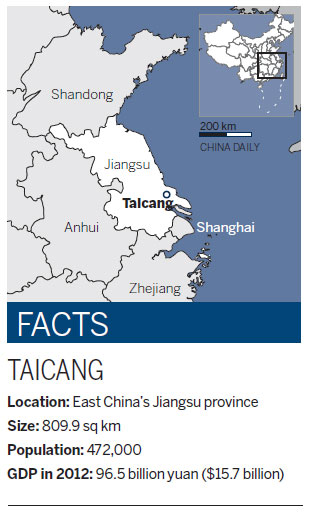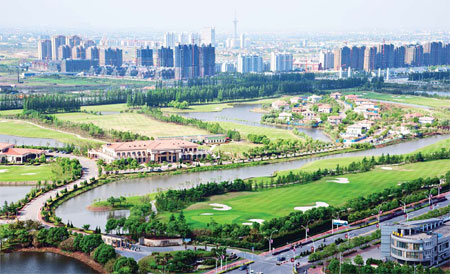Taicang's Teutonic dynamism
Updated: 2013-08-16 09:02
By Shi Jing (China Daily)
|
|||||||||||

|
The registered foreign investment by German companies amounted to $580 million in Taicang. Photos Provided to China Daily |

In a small city in Jiangsu province, technology and training are the watchwords
For the newly initiated to Taicang, it is hard to believe that there is such a quiet, small and tranquil city just 35 minutes' drive from noisy, sprawling and sleepless Shanghai.
Germans especially love Taicang, for many of whom the city has echoes of the Black Forest.
Their love for the county-level city in Jiangsu province is also manifested by the many small and medium-sized German companies clustered here. Local authorities reckon there were nearly 180 German SMEs in the city at the end of last year.
Last October, the Ministry of Industry and Information Technology named Taicang as a national demonstration center of Sino-German cooperation among SMEs, the only one in the country.
H. C. Strack, a technology metal supplier, is just one of many German companies that went to Taicang to test the water eight years ago, and ended up staying.
"The decision made then was absolutely right," says Jerry Ni, the company's general manager. "We have set up companies in Shanghai and Wuxi. But the process of starting up a company in Taicang was the fastest."
Covering a little more than 800 square kilometers and with a population of a little more than 470,000, Taicang's GDP was 96.5 billion yuan ($15.7 billion; 12 billion euros) last year, 10.3 percent higher than in the previous year. Industrial output was worth 245 billion yuan, up 5.6 percent from the year before.
By the end of last year, registered foreign investment was worth $1.6 billion, and the transferred foreign investment was $810 million, up 0.4 percent and 0.1 percent year-on-year respectively.
Among them were 53 newly approved foreign investment projects with investment of more than 10 million yuan each. In addition, there were three listed companies.
The registered foreign investment contributed by German companies amounted to $580 million, with the transferred amount $320 million.
In this year's Forbes 10 Richest Chinese County-level Cities, published in late July, Taicang ranked seventh with disposable income of 34,887 yuan per person in 2011.
"Every county-level city has its own development route, but for Sino-German cooperation, Taicang is out there by itself," says Feng Yuliang, vice-director of the administration committee of Taicang Economic Development Zone, where most of the German companies in Taicang are located.
The Taicang local government did extensive research before it moved to draw German companies to the city. Germany's highly developed and creative manufacturing, the country's emphasis on research and development and the large number of SMEs have all been exemplars for Taicang, Feng says.
As some European countries grapple with soaring unemployment, Germany is enjoying a jobless rate that is at itslowest in about 20 years, partly due to a highly effective training system.
"But in China, most companies cannot find the talent they need," Feng says.
Last year, research and development accounted for about 5 percent of Germany's GDP, compared with less than 2 percent in China. The rate in Taicang was slightly higher than the national average, and R&D is forecast to account for 2.5 percent of the city's GDP by the end of this year and 3 percent by 2015.
German companies also stress R&D in the Chinese market. "We are fully aware of the importance of China in terms of the world economy," says Jurgern Geissinger, president and CEO of Schaeffler AG, a world leading manufacturer of ball bearings for automotive, aerospace and industrial uses. "We will reinforce R&D as well as our production network in China and provide the Chinese customers products of the world's most advanced technology."
SMEs account for the bulk of German companies and provide more than 90 percent of job opportunities. With highly advanced technology and long histories, most German SMEs in Taicang have brands well-known worldwide, something many Chinese companies aspire to.
"As in Germany, SMEs are the pillar of China's economy," Feng says. "The Chinese government has been talking about establishing creativity-oriented companies for a long time. In German SMEs we see the quest for creativity. Taicang has learned a lot from them."
More importantly, Feng says, transport links built recently, including expressways and high-speed rail, are drawing Taicang closer to Shanghai, which is radiating its economic power. The one-hour economic circle in the Yangtze River Delta region will increase Taicang's opportunities for sharing resources with neighboring cities, he says.
German companies are attractive to Taicang particularly because of the emphasis they put on environmental protection, which is in line with Taicang's goal of building an eco-friendly city.
"All the German companies conduct environmental evaluations before they move to Taicang. That's not just to see whether the air and earth are suitable for production. They also do it to keep a record, promising to keep the environment as it had been if they leave Taicang 30 or 50 years later."
This care for the environment has greatly changed the mindset of local authorities. These days, for any company wanting to set up operations in the city the most important test it will undergo is from the local environmental protection authorities.
"If the environmental protection authorities happen to say no, we will not allow the company in, no matter how profitable it could be," Feng says.
Thilo Koeppe, general manager of Weiss-Voetsch Environmental Testing Instruments (Taicang) Co Ltd, which has increased its sales revenue from 3 million yuan to 40 million in three years, says the investment environment in Taicang has improved greatly in the past few years because of the local government's efficiency.
"They are very supportive to small companies of our kind," Koeppe says.
For German investors coming to Taicang, Taicang Chien-Shiung Institute of Technology is a must-go destination. There, investors can see a replica of the Duales Ausbildungssystem, or dual education system, the vocational school education system that Germany is well-known for. They can also get an idea of how much importance the local government has attached to training.
Initial investment in Chien-Shiung nine years ago was 900 million yuan. This year the local government invested another 500 million yuan for a new training center, which will be six times the size of the existing one.
The school is changing its courses accordingly, and apart from the traditional automotive and electromechanical majors, it has added biochemicals, logistics, port management and even the cultural and creative industry to its courses.
Over the past three years, about 98 percent of graduates from Chien-Shiung have obtained work, and the average salary for new graduates is said to be 150 yuan a month higher than for other university graduates in Jiangsu province. Before the students graduate, many German companies invite them to their offices to talk about their careers.
The dual education system, at the center of which is a three-year apprenticeship, was brought to Taicang by German companies, says Wei Xiaofeng, president of Taicang Chien-Shiung Institute of Technology.
"A common failing among Asian companies is that they are unwilling to invest in training staff. Instead, they prefer to headhunt already trained employees from competitors. However, German companies attach great importance to training. Before embarking on anything, the first thing they do is to set up a training center."
Taicang's economy is developed enough for it to be able to attach more importance to training, Wei says, which will greatly help in restructuring local manufacturing.
To Wang Yonglin, a senior member of Taicing City Committee of the Communist Party of China, Chien-Shiung is not only a brand name to attract investors, but also a role model for the country.
"All the county-level cities have a huge shortage of talent. Before reform and opening-up, Taicang used to hire so-called Sunday engineers from Shanghai, who were only available during weekends."
Wang says the regional economy is highly sensitive to change, and since 2000, Taicang has been restructuring, moving from traditional industries to emerging high-end technology industries. Taicang's economy has undergone huge change over the past five years as growth slowed and exports contracted.
"We have come to understand that the decision to focus on training based on cooperation with German companies was right," Wang says. "It is only with well-trained employees that economic restructuring, especially in manufacturing, is possible.
"As a result of intense competition, it is clear that traditional labor-intensive industries will fall by the wayside. All cities need their own industries. As for us, we need to combine industry, research and development closely so Taicang can find its path to growth."
shijing@chinadaily.com.cn
(China Daily European Weekly 08/16/2013 page16)
Today's Top News
List of approved GM food clarified
ID checks for express deliveries in Guangdong
Govt to expand elderly care
University asks freshmen to sign suicide disclaimer
Tibet gears up for new climbing season
Media asked to promote Sino-Indian ties
Shots fired at Washington Navy Yard
Minimum growth rate set at 7%
Hot Topics
Lunar probe , China growth forecasts, Emission rules get tougher, China seen through 'colored lens', International board,
Editor's Picks

|

|

|

|

|

|






